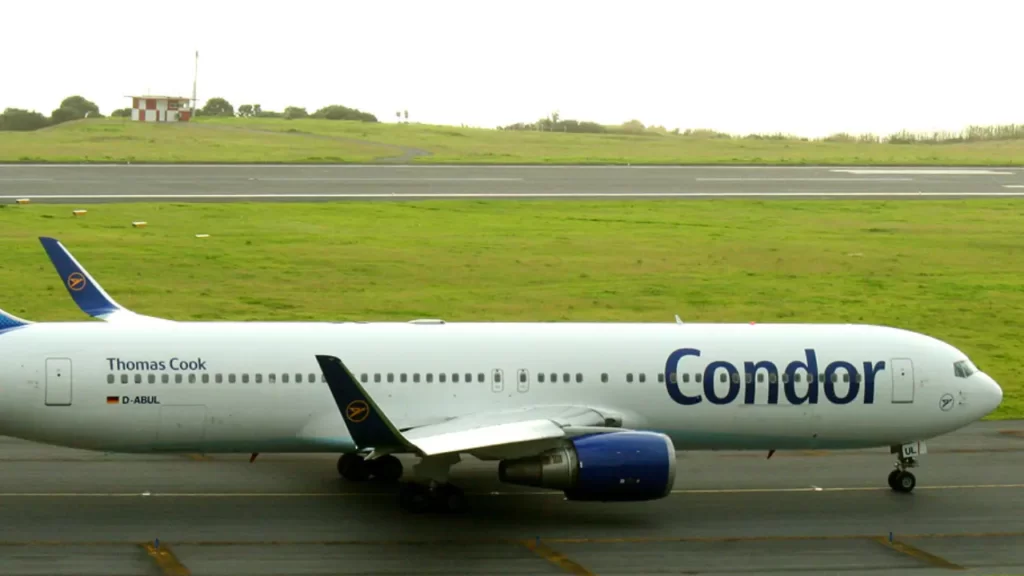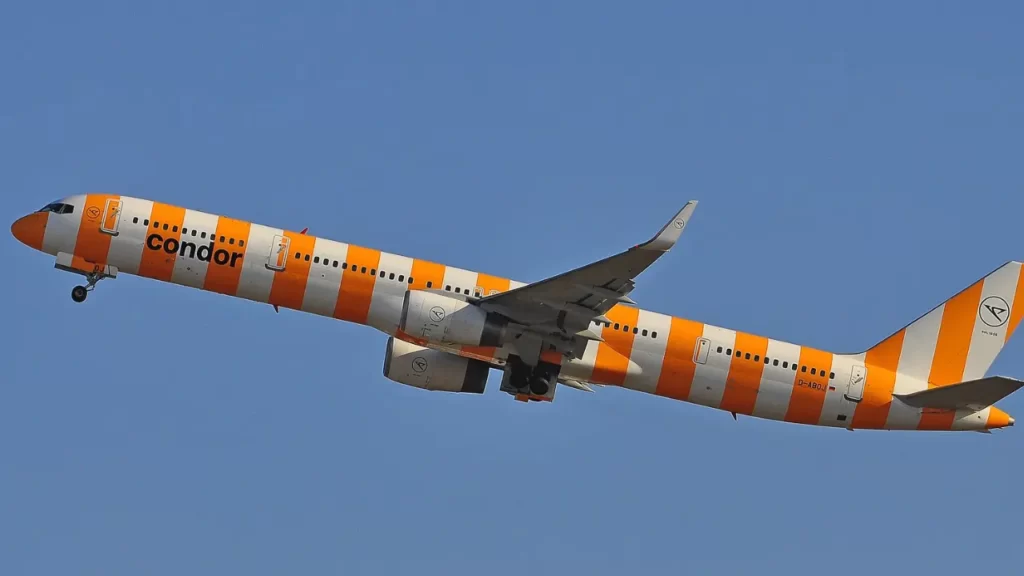
Condor Overview
Condor Flugdienst GmbH, commonly known as Condor, is a German leisure airline and part of the Thomas Cook Group. With a history dating back to the 1950s, Condor is known for its leisure and holiday-focused flights, serving popular vacation destinations. Here is an overview of Condor:
Table of Contents
Foundation and Early Years (1955)
Condor was founded in 1955 as Deutsche Flugdienst GmbH and began operations in 1956. The airline initially focused on providing charter flights to popular holiday destinations.
Integration into the Thomas Cook Group (2000)
- In 2000, Condor became part of the Thomas Cook Group, a major global travel company. The integration into the group strengthened Condor’s position in the leisure travel market.
Fleet Composition
- Condor operates a fleet of modern aircraft, including Boeing and Airbus models. The fleet is tailored to meet the demands of leisure travel, with a focus on flights to vacation destinations.
Holiday and Leisure Destinations:
- Condor specializes in providing flights to holiday destinations, particularly in the Mediterranean, Caribbean, Africa, Asia, and North America. The airline’s network is designed to cater to travelers seeking leisure and vacation experiences.
Charter and Scheduled Services:
- While Condor is known for its charter services, it also operates scheduled flights. The airline serves a mix of short-haul and long-haul routes, connecting major German cities with popular vacation spots.
Economy and Premium Classes:
- Condor offers both Economy Class and Premium Class with enhanced services. Premium-class passengers enjoy benefits such as increased legroom, upgraded meals, and priority boarding.
Thomas Cook Insolvency and Restructuring (2019):
- In September 2019, the Thomas Cook Group, including Condor, faced financial difficulties and declared bankruptcy. Condor continued operations independently and initiated restructuring efforts to secure its future.
Acquisition by LOT Polish Airlines and PGL (2020):
LOT Polish Airlines, together with its parent company PGL (Polska Grupa Lotnicza), acquired Condor in January 2020. The acquisition aimed to provide stability and a strategic partnership for the German leisure carrier.
Focus on Sustainability:
Like many airlines, Condor has expressed a commitment to sustainability. The airline explores initiatives to reduce its environmental impact, including fuel efficiency programs and considerations for sustainable aviation fuels.
COVID-19 Pandemic Challenges (2020s)
The global COVID-19 pandemic significantly impacted the aviation industry, including leisure-focused airlines like Condor. The airline, like others, faced challenges related to travel restrictions and reduced demand.
Resumption of Operations (2021 Onwards)
Condor has worked towards resuming its operations and adapting to the changing travel landscape. Efforts have been made to rebuild the airline’s operations and restore confidence among travelers.
Condor History

Founding and Early Years (1955-1960s)
Condor Flugdienst GmbH, commonly known as Condor, was founded on December 21, 1955, as Deutsche Flugdienst GmbH. Operations began in 1956, and the airline initially focused on providing charter flights to Mediterranean holiday destinations.
Growth and Expansion (1970s-1980s)
- Condor experienced significant growth during the 1970s and 1980s. The airline expanded its route network to include long-haul destinations such as North America, the Caribbean, and Asia. It became a popular choice for German holidaymakers seeking package deals.
Acquisition by Lufthansa (1990s)
- In 1991, Lufthansa, the German flag carrier, acquired a 26% stake in Condor. Subsequently, in 1997, Lufthansa increased its ownership to 100%, making Condor a fully-owned subsidiary. The acquisition aimed to strengthen Lufthansa’s presence in the leisure travel market.
Integration into Thomas Cook Group (2000):
- In 2000, Thomas Cook AG, a major international travel company, acquired Condor as part of its expansion into the leisure travel sector. Condor became a key player within the Thomas Cook Group, offering flights to various holiday destinations.
Fleet Modernization and Expansion (2000s-2010s):
- Condor modernized its fleet by introducing more fuel-efficient aircraft, including Boeing 757 and 767 models. The airline continued to focus on leisure destinations and expanded its operations to meet the demands of vacation travelers.
Thomas Cook Insolvency (2019):
- In September 2019, the Thomas Cook Group, including Condor, faced financial difficulties and declared bankruptcy. The collapse of Thomas Cook left Condor seeking protection from insolvency as it continued operations independently.
Acquisition by LOT Polish Airlines and PGL (2020):
- In January 2020, LOT Polish Airlines, together with its parent company Polska Grupa Lotnicza (PGL), acquired Condor. The acquisition provided stability and a strategic partnership for the German leisure carrier.
COVID-19 Pandemic (2020s):
- Like many airlines, Condor faced challenges due to the global COVID-19 pandemic. Travel restrictions and reduced demand significantly impacted the aviation industry, requiring adjustments and measures to ensure the airline’s survival.
Focus on Sustainability:
- Condor, under its new ownership, has expressed a commitment to sustainability. The airline explores initiatives to reduce its environmental impact, aligning with industry trends toward more sustainable aviation practices.
Resumption of Operations and Rebuilding (2021 Onwards):
Condor has worked towards resuming its operations and rebuilding its business. Efforts have been made to restore confidence among travelers and adapt to the evolving travel landscape.
Condor’s history reflects its evolution from a German charter airline serving Mediterranean destinations to becoming a key player in leisure travel under various ownership structures. The acquisition by LOT Polish Airlines and PGL marked a new chapter for the airline in its efforts to navigate industry challenges and continue providing vacation-focused air travel. Please note that developments may have occurred.
